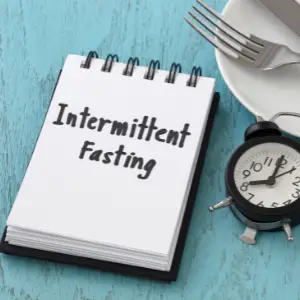During your research regarding dieting and losing weight, you may have come across the term “intermittent fasting.” That said, most people don’t know what this term entails, or why it is relevant to losing weight.
Intermittent fasting is a type of eating pattern in which you cycle between periods of eating and fasting, rather than choosing not to eat entirely. Of course, that’s a simplified version, but don’t worry about that. We’ll cover everything you need to know in this article.
Here, we’ll not only go into more detail about what intermittent fasting is, but we’ll also talk about whether it is safe to do if it can help you lose weight and the various different types of intermittent fasting techniques that exist.
What is Intermittent Fasting?
Intermittent fasting is a dieting strategy that is not about what you eat, but rather when you eat. The idea is that you only eat at certain times during the day or the week, and fast outside of those times.
Maybe you choose to eat only from 8 A.M. to 8 P.M., and no other time during the day. Or perhaps you choose to only eat one meal a day for the whole week. The idea is relatively simple: if you prolong the amount of time you don’t eat, your body will burn through the calories of your meals, then start burning fat to produce energy.
This is opposed to eating several meals a day or just eating with no schedule at all. imagine that you eat enough food for breakfast to supply you with calories until lunch, at which point you eat and get enough calories to last you until dinner. In such a scenario, you lose no weight because you never run out of calories from your meals.
But if you don’t eat for twelve hours after a meal, you will run out of calories before you eat again, prompting your body to burn fat in that timeframe. This is the basic concept behind intermittent fasting.
Related: Is Blending Food Bad For Me?
Is Intermittent Fasting Safe to Do?
Intermittent fasting has many potential benefits: some people use it to manage weight loss, while others use it to address chronic health issues, including things like irritable bowel syndrome and high cholesterol. That said, intermittent fasting is not for everyone. There are certain groups who should avoid this practice, such as:
- People who have diabetes or blood sugar problems
- Those who have eating disorders
- Individuals under the age of 18
- Women who are breastfeeding or pregnant
If you are not in one of these categories, there is generally no great hazard to intermittent fasting. That said, one should always speak to their primary care practitioner before trying intermittent fasting. Everyone will react to this practice differently, it’s not universal.
Related: Why Did I Gain Weight During My Marathon Training?
Can Intermittent Fasting Help You Lose Weight?
Simply put, yes, it an. As discussed previously, the idea behind intermittent fasting is allowing enough time between meals for your body to burn through calories and start using stored body fat as a source of energy. Any time your body is burning body fat instead of calories, you’ll be losing weight.
That being the case, how effective at losing weight this practice is depends on how you go about it. There are several different strategies when it comes to intermittent fasting, some of which may be more beneficial for you than others. We’ll discuss these various intermittent fasting techniques below.
Related: Can Running Give You A 6-Pack?
The 16:8 Method
This is a very simple intermittent fasting strategy in which you eat all of your meals for a day within an eight-hour period. For instance, you may elect to only eat from 8 A.M. to 4 P.M. After that, you do not eat for the next sixteen hours until is 8 A.M. again.
This is a popular intermittent fasting strategy because it is a daily schedule for people to adhere to. That makes it easier to stick to the regimen, especially if you have never engaged in intermittent fasting before.
It’s also a good strategy because it has you fasting for a reasonable amount of time. You still get to eat every 24 hours, which appeals to many people. On top of that, it can be dangerous to fast for extremely long periods of time, so this is a safer intermittent fasting strategy.
The 5:2 Method
This method is a little more complicated, as it is a weekly regimen instead of a daily one. With the 5:2 method, you eat as you normally would for five days out of the week. Then, for the next two days, you ut your caloric intake to 25% of what it would normally be.
So if you would normally consume 2,000 calories on a normal day, for those two days, you would only consume 500 calories for the entire day on each one. You do not necessarily have to do this sequentially.
In other words, you could pick any two days to be your 25% calorie days. You could pick Monday and Tuesday, or Thursday and Saturday. In some cases, it is better to actually spread out the two reduced-calorie days, because it’s easier to fast for one day than it is to fast two days in a row.
Related: What Is The Mediterranean Diet? Is It Good For Runners?
The Eat, Stop, Eat Method
This intermittent fasting method has been popularized by Brad Pilon, author of the book of the same name. The concept is simple, and even quite similar to the 5:2 method, with some minor alterations. With this method, you choose one or two days out of the whole week in which you eat nothing at all for 24 hours.
Not eating for such a long period of time would definitely force your body to use stored glucose, which can help you lose weight, but thus far, there are no official studies that support the effectiveness of this method.
It’s also worth noting that you don’t want to fast for periods of time that are too long. Odd though it may seem, if you begin to starve yourself unintentionally, your body will actually begin to store more fat in response. 24 hours is about the longest you should fast, and it’s definitely something you should do sparingly.
Related: Best Exercise Machines To Help You Lose Weight
Alternate Day Fasting
This intermittent fasting method is very simple and straightforward. The basic concept is just to eat what you want to eat on one day, then fast the entirety of the next day. This strategy can be hard to maintain since most people have trouble alternating so frequently.
However, it’s also a pretty good strategy if you want to keep your weight down, since fasting every other day means your body will never go very long without burning some glucose as opposed to calories.
Still, for a lot of people, it’s difficult to stay disciplined with such a method, so it’s not always the best choice for beginners.
Related: What Is The Keto Diet? Is It Good For Runners?
Can You Eat Whatever You Want on Non-Fasting Days?
An important thing to note about intermittent fasting is that it does not exclude you from eating a healthy diet. Fasting in and of itself does not negate the eating of unhealthy food. For instance, just because you plan to fast on Tuesday doesn’t mean you should gorge yourself on 5000 calories worth of junk food on Monday.
This is because, even if you will fast soon, calories that are not burnt as energy within a certain timeframe get stored as body fat. So if you ate 5000 calories one day for some reason and 3000 of those calories ended up getting stored as body fat, then even fasting for the entirety of the next day may not get rid of all of it.
So even if you plan on engaging in intermittent fasting, you still have to be mindful of what you eat. This type of dieting doesn’t mean you can eat whatever you want without any consequences whatsoever.
Related: What Is The Paleo Diet? Is It Good For Runners?
Summary
Intermittent fasting is a type of dieting that focuses not on what you eat, but rather, on when you eat. The idea is to eat normally at certain times and to fast at other times. You may eat normally for five days then fast for two, or something similar.
There are many different techniques when it comes to intermittent fasting, but they all follow the same general rules. It’s not particularly dangerous to practice intermittent fasting, but you should always consult your primary care physician before you engage in it.
Keep in mind that it is dangerous to fast for extremely long periods of time (such as longer than 24 hours) and fasting for that long could even backfire completely, as starvation can incite your body to actually start storing more fat for survival.
All of that said, intermittent fasting is a good strategy if you are trying to lose weight regularly. Because you fast fairly often, you are constantly burning away stored body fat instead of calories. It can be very effective, as long as you make sure it is right for you to do.
Related: What Is Meal Prepping? What are the best meal preparations for runners?
| Help support me and subscribe to my YouTube channel. YouTube video - 30 ways to make your runs less painful! Coach Scott's Credentials:
|
To sign up for a FREE half marathon training schedule, log sheet, and pace predictor CLICK HERE.

Recommended gear for runners
Connect with me:
| facebook.com/BeginnerToFinisher/ |
